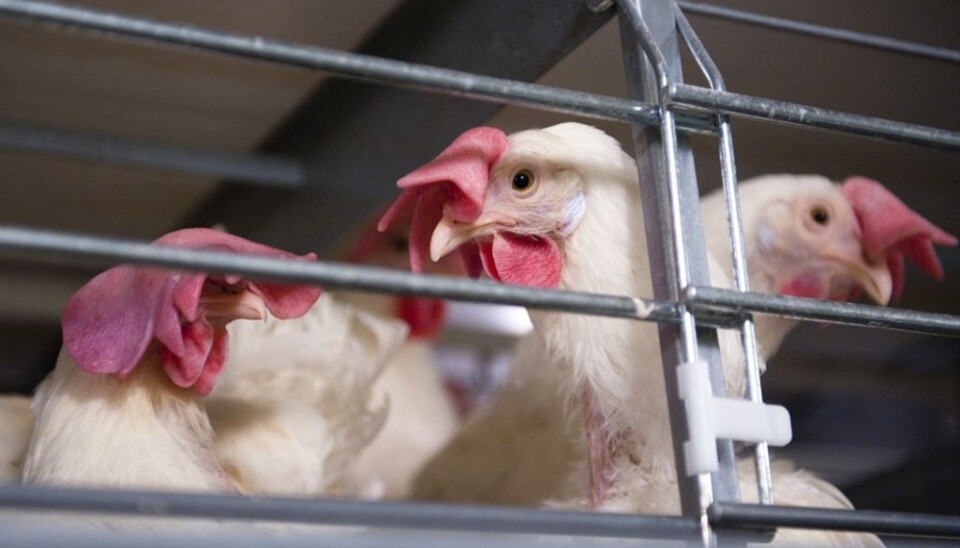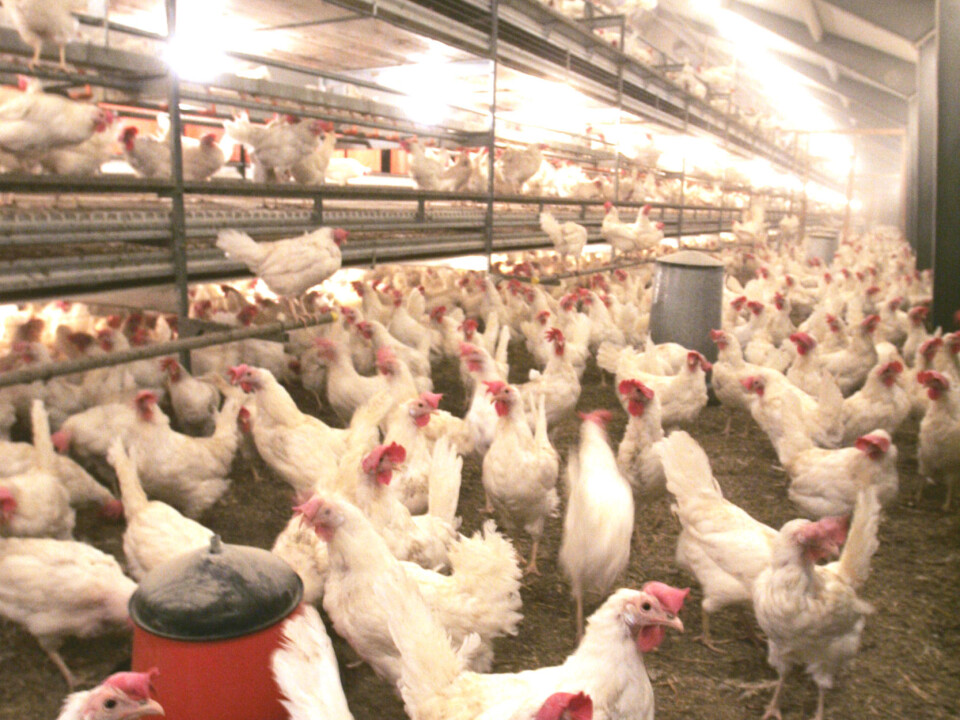An article from Norwegian University of Life Sciences (NMBU)

Do free-range chickens have better memory than caged chickens?
With a lot of help from 48 feathered friends, a Norwegain researcher is studying chickens' ability to learn and remember.
Denne artikkelen er over ti år gammel og kan inneholde utdatert informasjon.
Fernanda Tahamtani crouches beside a chicken coup and explains the new chicken experiment. The chickens stick their heads out of the cage and nip at her arm and clean their feathers very close to where she sits. This shows that they are comfortable with her.
The researcher has scarcely seen the sun in the last few weeks. She spends her days together with 48 chickens in the cellar of a building at the Norwegian University of Life Sciences (NMBU).
The goal is to investigate the memory and learning of chickens, and to see whether there are differences between free-range chickens, or aviaries, and chickens who are raised in cages.
For a period of six weeks, Research Fellow Tahamtani has set out nine cups in a room: Three of the cups – always the same ones – contain the favourite food of the chickens: mealworms. The other cups are empty.

Even though final results will not be available until 2016, the experiment is beginning to give some indications.
Caged chickens vs free-range chickens
"I bring in one chicken at a time, place it in a corner, and leave the room. I observe the chicken from outside the room, to see if she has learned which cups contain the goodies", says Tahamtani.
The exercise is done with all of the chickens twice a day, six days a week.
The short-term memory, or the working memory, of the chickens provides information on what takes place in a short period of time. Tahamtani is studying how efficient the chickens are at procuring food, and whether they remember where they have been and what happened at that actual place.
"In order to be the most efficient, they must therefore remember which cups they had tried in order to avoid trying them again. We expect that the chickens from aviaries will find out where the food is more quickly than the chickens from cages. This is because they have grown up in a much more complex environment, in which they must make an effort to find food and water", says the researcher.
Very good memory
Associate Professor Andrew M. Janczak tells of an early change in the behaviour of the chickens after the experiment began.
"A complex environment with challenges that these chickens have had, clearly contributes to brain activity and to a close relationship between humans and animals," says Janczak.
"When Tahamtani enters the room, the chickens know that food is on the way."
It was not like that in the beginning. Then the chickens could sit in the corner they were placed in for a long time, and move randomly around the room.
"Now I have been doing this for five weeks, and many of the chickens reveal a very good memory. Some of the chickens are so fast that I must hurry out to be sure that I manage to survey them", Fernanda Tahamtani smiles.
Several of the chickens know exactly where to find the mealworms, and they don't even bother to check the other cups anymore.
"It will be exciting to go through the material collected, and see if it shows that the early growth environment influences learning", Tahamtani states.
Know food is on the way
The investigation of the long-term memory concerns information the chickens have acquired over time. The goal of the study is to find out if they have the ability to learn over time, if they have the ability to learn several tasks, and whether being raised in a complex environment has lasting effects on the brain that influence the ability to learn.
"The chickens I have now worked with for several weeks have developed good brain capacity. They have learned that when I come to get them, food is on the way. They know that they must put their heads down into a cup to find the food, and that the food can only be found a few places in the room. None of the chickens spend a lot of time looking in the cups that are empty. In other words, they have become more efficient at the task", proclaims Tahamtani.
The project is being carried out by the Animal Welfare Research Group at NMBU, and it is financed through the Agricultural Agreement, the Agricultural Research Tax Fund (FFL) and Animalia.
------------
Read the Norwegian version of this article at forskning.no
































